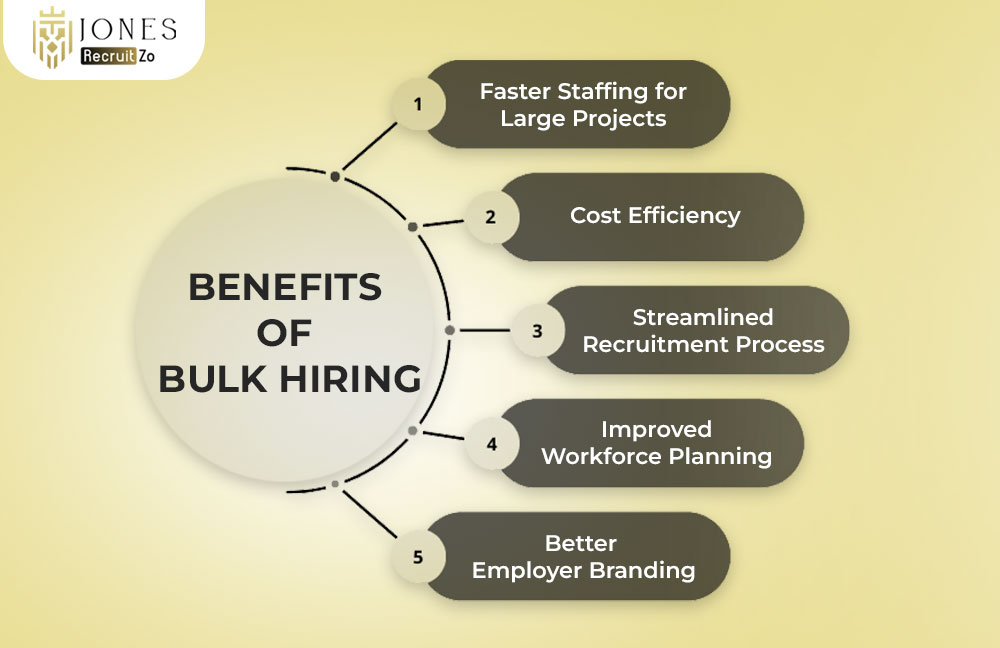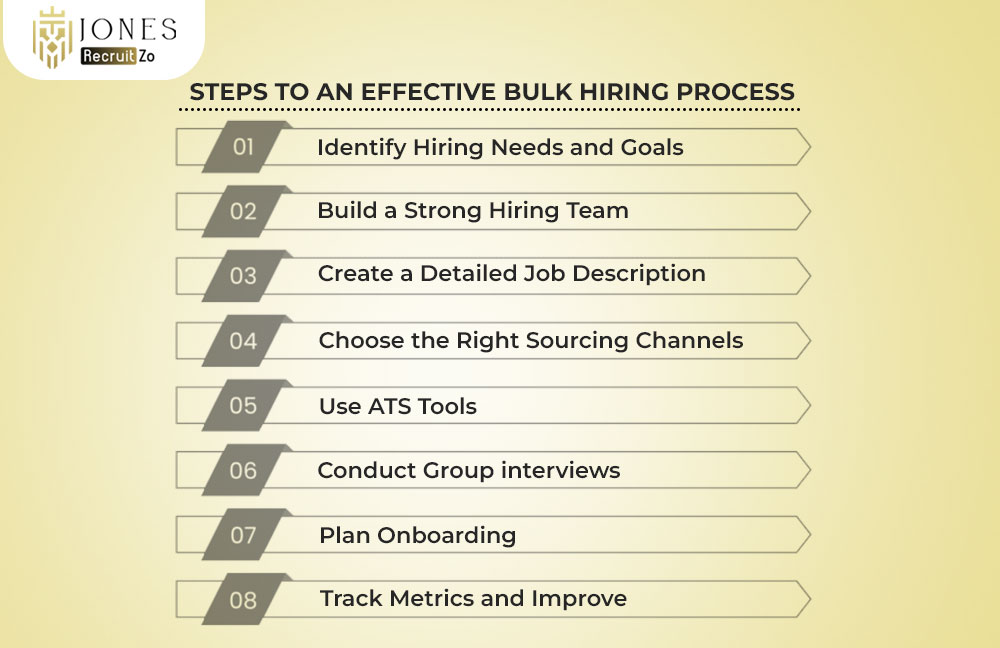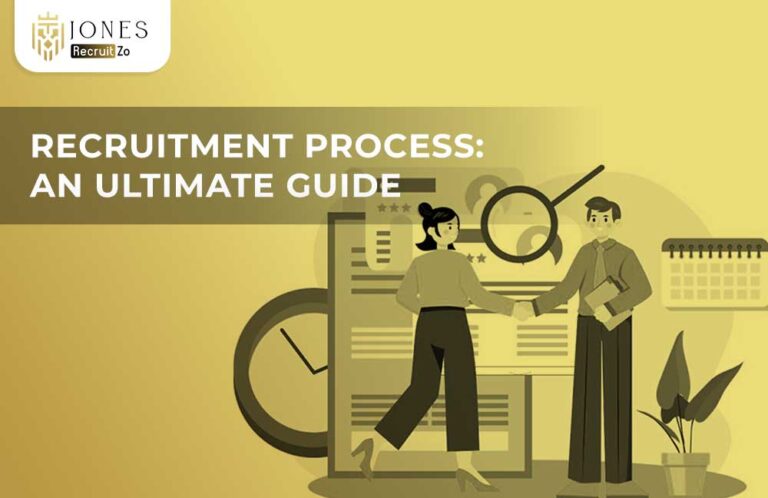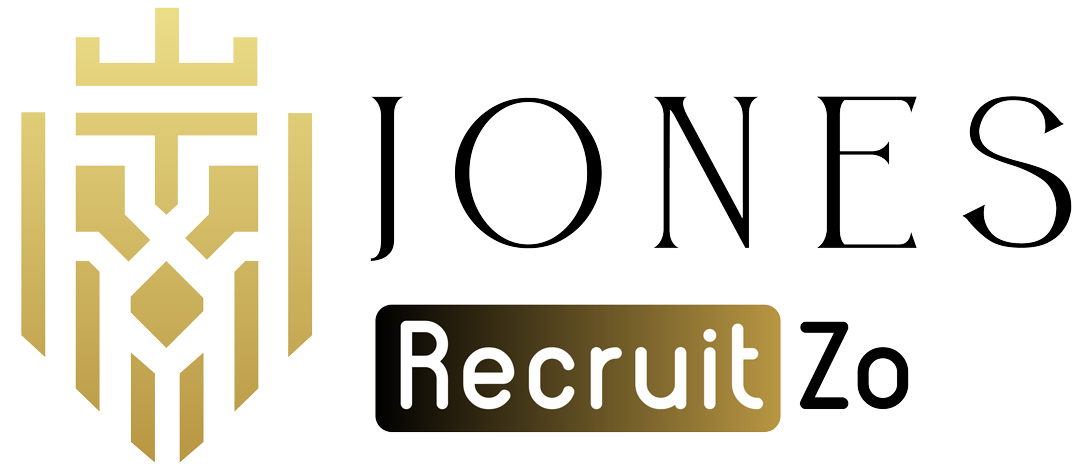Key Insights
Bulk Hiring Meaning
Bulk Hiring, also known as mass recruitment or volume hiring, refers to the process of recruiting a large number of candidates in a short time frame, usually for similar job roles.
How to Do Bulk Hiring Effectively
Effective bulk hiring starts with identifying needs, building a skilled hiring team, writing clear job descriptions, using sourcing platforms and conducting group interviews.
Benefits of Bulk Hiring
Bulk hiring offers several advantages. It enables faster staffing for large projects, reduces recruitment costs, streamlines the hiring process, and supports better workforce planning.
What is Bulk Hiring?
Bulk hiring is a process of recruitment in which multiple candidates for the similar kind of job are recruited within a short time. Thus, this method is usually followed by organisations as they want to quickly set up or expand their workforce. Time and efficiency are critical in this method, but it does not take away the effectiveness of the kind of talent being brought in.
What Is Bulk Hiring Also Called?
Bulk hiring is sometimes called mass hiring or volume hiring. These names basically describe the action of hiring multiple candidates simultaneously, typically for the same general position or function within an organisation.
When Do Companies Opt for Bulk Hiring?
There are several situations where businesses need to scale their workforce quickly. The approach is particularly useful under the following conditions:
Business Expansion
When a company grows-new branches open, new sales territories come into being, or departments are created-mass hiring lets it employ people to get things done. Bulk hiring thus facilitates the expansion by ensuring that roles are actually filled within a short timeframe.
Seasonal Demand
Some industries, like those of retail and logistics, have periods of the year when higher demand spikes. Therefore, an accelerated arrangement for hiring in bulk during such times helps to ensure that companies are able to cope smoothly with the increased workload.
Project-Based Needs
Few projects have stringent deadlines and demand sudden manpower injections. Bulk hiring removes the constraint so that project deliverables could be targeted instead of limiting the thinly spread existing teams.
High Attrition
In high-attrition sectors, it is quite difficult to maintain even operational capacity. Bulk hiring compensates for such defects by ensuring that genuine vacancies are filled in and frequent exits are nullified.
Benefits of Bulk Hiring

Hiring at scale not only addresses immediate staffing needs but also brings strategic advantages. Here are some of the key benefits:
Faster Staffing for Large Projects
Bulk hiring allows companies to provide a huge number of job openings at short notice. This would maintain project momentum without delays due to staffing gaps.
Cost Efficiency
Hiring many candidates at one time lessens the cost of hiring for every single case. For example, advertising once, interviewing candidates in bulk, and conducting joint induction programmes make the whole operation cheaper.
Streamlined Recruitment Process
Being systematic helps the whole recruitment procedure to be smooth and orderly. It allows better coordination among teams and ensures fairness in all assessments.
Improved Workforce Planning
Having a good understanding of the need for human resources, companies tie in bulk recruitment with long-term workforce planning and thus manage future demands better.
Better Employer Branding
Properly pursued bulk hiring opportunities present the company in a professional light. Creating a positive candidate experience further strengthens the employer brand in the market.
Steps to an Effective Bulk Hiring Process

Executing a successful bulk hiring campaign requires careful planning and execution. The steps below ensure the process remains efficient and goal-driven:
Identify Hiring Needs and Goals
Such an exercise demands a definition of the number of roles, timelines, and required skills. Having this clarity will steer the recruitment effort working in their favour. Additionally, it must be aligned with business objectives.
Build a Strong Hiring Team
The presence of an efficient team with neatly delineated roles and responsibilities is a must. A coordination process among HR, recruitment partners, and department heads goes a long way in deciding the fate of the hiring exercise.
Create a Detailed Job Description
A properly drafted job description will attract the right candidate and avoid ambiguities. It should state expectations of the position, qualifications, and the scope of the job.
Choose the Right Sourcing Channels
Be sure to use different platforms for sourcing, such as job portals, employee referrals, advertising on social networking sites, and campus recruitment. More sources means more probability of quickly finding suitable candidates.
Use ATS Tools
An applicant tracking system simplifies the recruitment process and helps efficiently manage applications, schedule interview dates, and track progress.
Conduct Group interviews
Interviewing candidates in groups can save time and provide insights into communication, problem-solving, and teamwork. It also allows comparison of multiple candidates in a single setting.
Plan Onboarding
Structured onboarding enables the new hire to more quickly begin working in their new role. This aids in engagement and reduces early attrition.
Track Metrics and Improve
Track metrics such as recruitment time-to-hire, offer acceptance rate, and retention. Analysing these with an eye to improving will help deflate future hiring efforts.
FAQs
1) What is Bulk Hiring?
Bulk hiring suggests that a large number of candidates are recruited for similar roles in a short period, usually to meet urgent or large-scale demands.
2) What are the benefits of bulk hiring?
Bulk hiring promotes faster recruitment, lower hiring costs, a more efficient process, better workforce planning, and even enhanced employer branding.
3) What are the steps to an effective bulk hiring process?
Key steps include: identifying hiring goals, forming a hiring team, preparing job descriptions, selecting sourcing channels, making use of ATS tools, conducting group interviews, planning onboarding, and keeping track of performance.
4) When do companies opt for bulk hiring?
Companies turn to bulk hiring during business expansion, seasonal spikes, project-based requirements, or when experiencing high attrition rates.














